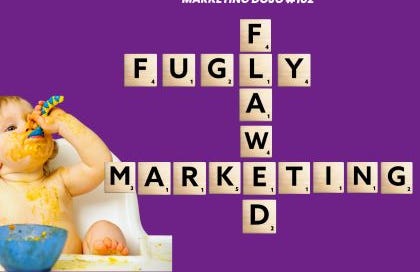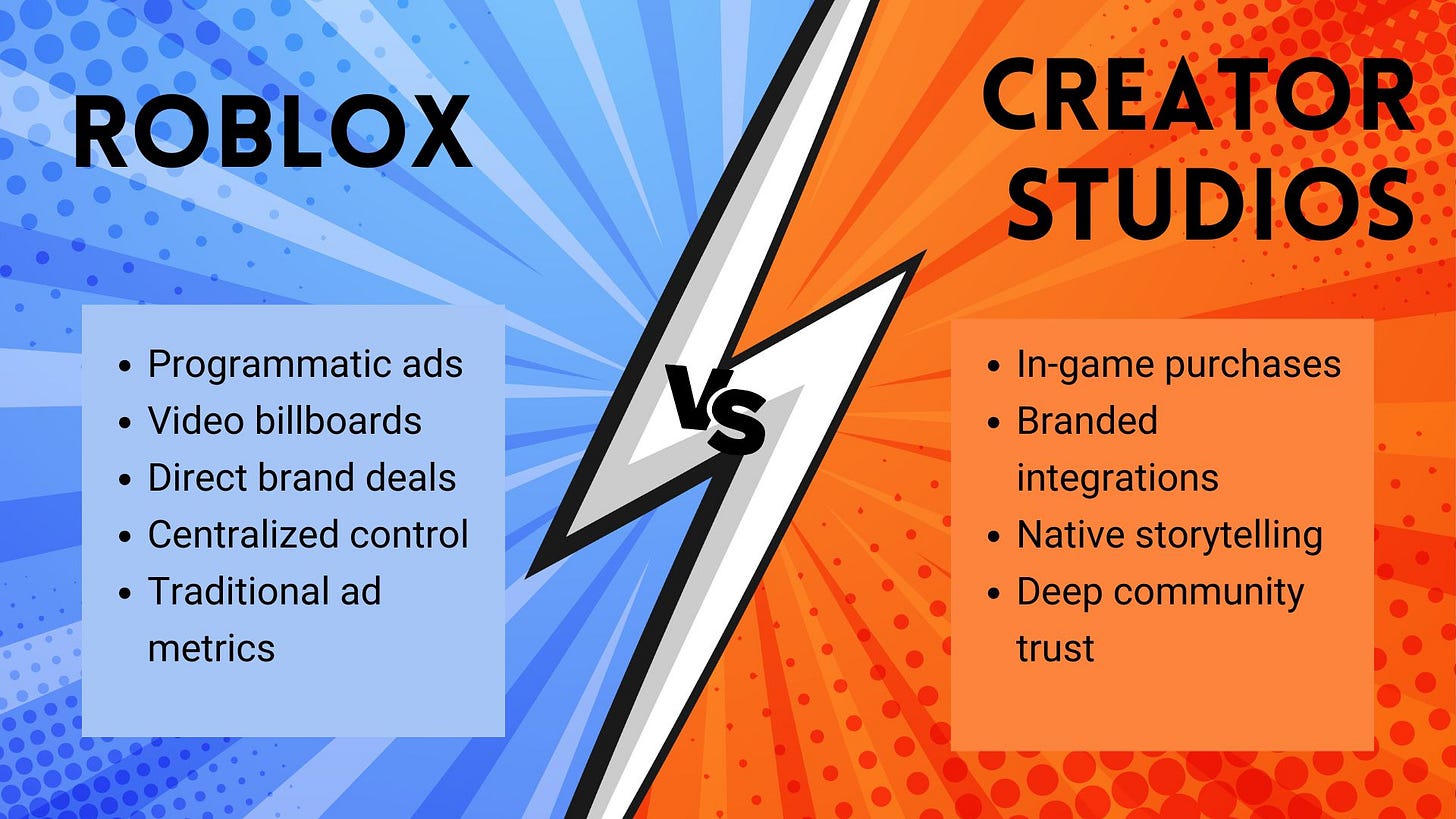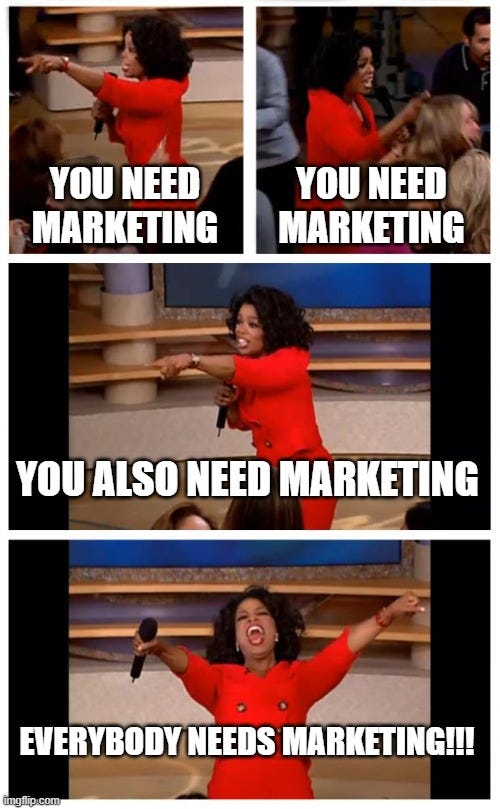Marketing Dojo #102: 😵💫 Fugly, Flawed, and Freakin’ Fab💅
Quaker Oats embraces messy breakfasts, the case for investing in marketing, Meta job scam and more.
We invite you to join us as Growth Marketing Manager at Meta.
Last week, I was sipping coffee at a friend's place when I received this rather generous and personalized invitation to join Meta.
Two minor issues:
I haven't updated my CV in months.
I haven't applied for roles.
So why was I suddenly in Meta's talent pool? 🤔
Turns out it was a well-planned scam built to prey on job seekers. 🤯
I have shared more details in P.S section so that you know how to spot one. 🦊
Scammers are getting craftier by the day. Remember when our biggest worry was that Nigerian prince who just needed a small loan of $100 to unlock his millions? Those were simpler times.
But here's something you can trust: every issue of Marketing Dojo remains 100% real, authentic, and spam-free. Here's what we're unpacking this week:
🥣 Quaker Oats in embracing Fugly
🎮 Roblox’s Catch-22 situation
🎧 5 Podcast recommendations
😂 Memetime: Everyone needs marketing
Ever sent something into a black hole? I have. I do it every week.
Pressing send on this newsletter sometimes feels like launching a message into the void. But then a comment, like or restack comes in - a signal that maybe this wannabe writer isn’t just imagining things.
So if you’re reading this, do me a favour— Subscribe, drop a like or leave a comment.
Major thanks. Human to human.
Too Ugly for Instagram, Just Right for Quaker.
Picture-perfect images are taking over advertising. Smiling faces, flawless skin and foods that shine - I often look at ads and wonder if these are highly processed or just AI-generated. On some days, aesthetics and vibes just seem to dominate substance and authenticity.
Which is why Quaker Oat's Deliciously Ugly campaign is such a clever way to stand out. The campaign idea is simple - less-than-perfect images of clumpy, messy oats that are a perfect breakfast.
Zig while everyone zags is a common theme for standing out in marketing. In Quaker Oats's case, the messy reality is far more in line with its message than the synthetic images we are exposed to daily.
Roblox Is Switching Teams Mid-Game.
With 216 million monthly active users and a staggering 4.6 billion registered accounts, Roblox is the largest gaming platform globally.
It is also emerging as a new form of social media for younger generations, especially for Gen Alpha.
But here's the platform's brewing existential crisis: Roblox is now directly competing with the creator studios that made it successful.
Here's a TL;DR: In-experience purchases, subscriptions and passes, immersive ads and customer brand integrations are the four primary ways in which creator studios on Roblox make their money. These revenues incentivize them to keep building the 14 million+ experiences that make Roblox sticky.
In 2024 alone, Roblox's creator community earned $923 million.
But things are changing in 2025; Roblox is now pushing for direct advertising. Roblox has started selling more ads and sponsorship opportunities directly to brands. The total pool of brand spending on Roblox isn't growing.
So, every dollar Roblox earns in direct advertising is a dollar that is not going to the creators.
While creators raked in nearly a billion dollars, Roblox made just a few thousand from direct advertising in the same period.
(Yes, a few thousand. With a 4.6 billion user base.)
Roblox's introduction of programmatic ads and video billboards demonstrates its push to monetize its platform directly, making it a competitor to its creator studios.
Young users spend up to 2.4 hours daily on the platform. It is also an enticing place for brands who want to be relevant to the next-gen - 59% of Gen Alpha users report discovering new brands while gaming on Roblox.
As Roblox tries to become the next-gen YouTube and the next-gen Instagram, it risks alienating its most powerful asset: its creator studios.
As brand owners, it will be essential to keep an eye on whether Roblox continues to foster the makers of its sticky gaming experiences or becomes yet another walled garden.
Memetime: Marketing Is Not Optional.
Every organization, agency, and nonprofit should invest in marketing. The recent chaos stirred up by DOGE in the U.S. is proof.
I typically stay away from politics, and I intend to keep it that way. But a recent Fortune article raises a crucial point: not investing in marketing has left certain government agencies more vulnerable to cuts and slashed funding by the newly formed DOGE.
Take the National Institutes of Health. They have a nearly $50 billion budget—but no Chief Marketing Officer. No marketing department. No storytelling strategy.
And yet, they've helped enable cancer therapies, Alzheimer's research, and the foundational science behind GLP-1 drugs like Ozempic and Wegovy. Massive societal impact. But a near-total absence of public narrative.
The agency is gearing up for massive layoffs and restructuring.
NASA, on the other hand, represents the gold standard in storytelling. As the Cold War subsided, NASA's massive budget came under intense scrutiny. After the Apollo 17 mission, the agency saw its funding cut by half.
But today, NASA's value to its audience is absolute. The space agency maintains an active social media presence where it shares stunning visuals, livestreams, accessible explanations, and builds public excitement around space exploration.
Not to mention their absolutely cracking list of spinoffs that help us Earthlings daily.(Fun fact: I lead one of those spinoffs.)
So here's the takeaway: Even if you're not "selling" anything, you still need marketing.
Compelling storytelling doesn't just drive awareness—it can be why an organization survives. Your work won't speak for itself in today's attention economy, no matter how important. You need to speak for it. Intentionally.
5 Podcast Recs. 0 Fluff.
Most interesting marketers are the curious ones.
I caught up over a cup of coffee with
. Our conversations naturally drifted towards some super high-quality podcasts.Here are our top 5 recommendations:
1. The Big Story by AdExchanger: The go-to podcast for ad tech insights.
2. How I Write: This podcast, hosted by David Perell, explores the craft of writing (and thinking).
3. This Week in Startups: VC wisdom and tech innovation unpacked
4. The Hidden Brain: A layman’s guide to the psychology behind creativity and human behaviour.
5. The Knowledge Project: Deep conversations on mental models, decision-making, and leadership.
What’s a podcast that’s sparked your curiosity recently? Share your favourites in the comment.
Short Stuff:
Unilever to cut costs by 50% by relying on AI instead of photoshoots (AI adoption is expanding).
Google claims that news sites make an insignificant contribution to their advertising business (A negotiating tactic with the news publishers?)
Meta plans to employ third-party fact-checkers in Australia to combat misinformation ahead of elections (Meta might be heading towards flexible moderation policies based on Government directives).
That’s a wrap on this week. Thank you for your time and attention. If you liked this week’s newsletter or found something interesting, please give me a like ❤️ or drop a comment🗨️. Your support helps drive the newsletter's discoverability.
I will see you in your inbox next Wednesday.
Regards,
P.S: I almost got job scammed.
On Thursday evening, I received this email from "Meta" inviting me to join them as a growth marketing manager. Here's a super short video I shot to describe what happened next. It's also on TikTok if you want to spread the word.






